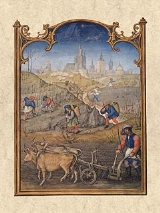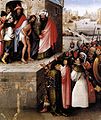
Walter Kennedy
Encyclopedia

Scotland
Scotland is a country that is part of the United Kingdom. Occupying the northern third of the island of Great Britain, it shares a border with England to the south and is bounded by the North Sea to the east, the Atlantic Ocean to the north and west, and the North Channel and Irish Sea to the...
makar
Makar
A makar is a term from Scottish literature for a poet or bard, often thought of as royal court poet, although the term can be more generally applied. The word functions in a manner similar to the Greek term which means both maker and poet...
associated with the renaissance court of James IV
James IV of Scotland
James IV was King of Scots from 11 June 1488 to his death. He is generally regarded as the most successful of the Stewart monarchs of Scotland, but his reign ended with the disastrous defeat at the Battle of Flodden Field, where he became the last monarch from not only Scotland, but also from all...
. He is perhaps best known as the defendant against William Dunbar
William Dunbar
William Dunbar was a Scottish poet. He was probably a native of East Lothian, as assumed from a satirical reference in the Flyting of Dunbar and Kennedie , where, too, it is hinted that he was a member of the noble house of Dunbar....
in The Flyting of Dumbar and Kennedie
The Flyting of Dumbar and Kennedie
Schir Johine the Ros, ane thing thair is compild, also known as The Flyting of Dumbar and Kennedie, is the earliest surviving example of the Scottish version of the flyting genre in poetry. The genre takes the form of a contest, or "war of words", between two poets, each trying to outclass the...
, but his surviving works clearly show him to have been an accomplished "master" in many genres. It is likely that a significant body of poetry by him has been lost.
His most impressive surviving poem is The Passioun.
Life
Kennedy was born into the Scottish Clan KennedyClan Kennedy
Clan Kennedy is a Scottish clan and an Irish surname.-Origins:The Kennedys had their home territory in Carrick in Ayrshire, in southwestern Scotland. Originally they were of Pictish/Norse stock from the Western Isles. In the fifteenth century, one Ulric Kennedy fled Ayrshire to Lochaber in the...
, a principal aristocratic family in South Ayrshire
South Ayrshire
South Ayrshire is one of 32 council areas of Scotland, covering the southern part of Ayrshire. It borders onto East Ayrshire, North Ayrshire and Dumfries and Galloway....
. This was part of the Galloway
Galloway
Galloway is an area in southwestern Scotland. It usually refers to the former counties of Wigtownshire and Kirkcudbrightshire...
Gàidhealtachd
Gàidhealtachd
The Gàidhealtachd , sometimes known as A' Ghàidhealtachd , usually refers to the Scottish highlands and islands, and especially the Scottish Gaelic culture of the area. The corresponding Irish word Gaeltacht however refers strictly to an Irish speaking area...
, a strong Gaelic-speaking area of the Scottish Lowlands. He was almost certain to have been a native speaker of the language. Educated at the University of Glasgow
University of Glasgow
The University of Glasgow is the fourth-oldest university in the English-speaking world and one of Scotland's four ancient universities. Located in Glasgow, the university was founded in 1451 and is presently one of seventeen British higher education institutions ranked amongst the top 100 of the...
, he graduated as MA
Master of Arts (Scotland)
A Master of Arts in Scotland can refer to an undergraduate academic degree in humanities and social sciences awarded by the ancient universities of Scotland – the University of St Andrews, the University of Glasgow, the University of Aberdeen and the University of Edinburgh, while the University of...
in 1478.
As great-grandson of Robert III
Robert III of Scotland
Robert III was King of Scots from 1390 to his death. His given name was John Stewart, and he was known primarily as the Earl of Carrick before ascending the throne at age 53...
and nephew of James Kennedy, bishop of St Andrews, Kennedy would have been very well-connected in the royal court. He possessed estates in both Carrick
Carrick, Scotland
Carrick is a former comital district of Scotland which today forms part of South Ayrshire.-History:The word Carrick comes from the Gaelic word Carraig, meaning rock or rocky place. Maybole was the historic capital of Carrick. The county was eventually combined into Ayrshire which was divided...
and Galloway
Galloway
Galloway is an area in southwestern Scotland. It usually refers to the former counties of Wigtownshire and Kirkcudbrightshire...
and is known to have held ecclesiastical posts such as rector of Douglas
Douglas, South Lanarkshire
Douglas is a village in South Lanarkshire, Scotland. It is located on the south bank of the Douglas Water and on the A70 road that links Ayr, on the West coast of Scotland, to Edinburgh on the East, around 12 miles south west of Lanark. The placename is of Gaelic origin, derived from the Old Gaelic...
and canon
Canon (priest)
A canon is a priest or minister who is a member of certain bodies of the Christian clergy subject to an ecclesiastical rule ....
of Glasgow Cathedral
Glasgow Cathedral
The church commonly known as Glasgow Cathedral is the Church of Scotland High Kirk of Glasgow otherwise known as St. Mungo's Cathedral.The other cathedrals in Glasgow are:* The Catholic Metropolitan Cathedral Church of Saint Andrew...
although records show that his right to hold at least one of his posts was contested by the Holy See
Holy See
The Holy See is the episcopal jurisdiction of the Catholic Church in Rome, in which its Bishop is commonly known as the Pope. It is the preeminent episcopal see of the Catholic Church, forming the central government of the Church. As such, diplomatically, and in other spheres the Holy See acts and...
in Rome.
Although Kennedy's surviving works are written in Middle Scots
Middle Scots
Middle Scots was the Anglic language of Lowland Scotland in the period from 1450 to 1700. By the end of the 13th century its phonology, orthography, accidence, syntax and vocabulary had diverged markedly from Early Scots, which was virtually indistinguishable from early Northumbrian Middle English...
he may also have composed in Gaelic. In the Flyting, for instance, Dunbar makes big play of Kennedy's Carrick
Carrick, Scotland
Carrick is a former comital district of Scotland which today forms part of South Ayrshire.-History:The word Carrick comes from the Gaelic word Carraig, meaning rock or rocky place. Maybole was the historic capital of Carrick. The county was eventually combined into Ayrshire which was divided...
roots (albeit in the rankly insulting terms that are part of the genre) and strongly associates him with Erschry, which meant in other words the bard
Bard
In medieval Gaelic and British culture a bard was a professional poet, employed by a patron, such as a monarch or nobleman, to commemorate the patron's ancestors and to praise the patron's own activities.Originally a specific class of poet, contrasting with another class known as fili in Ireland...
ic tradition. By this time, the term Irish
Goidelic languages
The Goidelic languages or Gaelic languages are one of the two branches of the Insular Celtic languages, the other consisting of the Brythonic languages. Goidelic languages historically formed a dialect continuum stretching from the south of Ireland through the Isle of Man to the north of Scotland...
in Scotland signified Gaelic generally:
- Sic eloquence as thay in Erschry use,
- In sic is sett thy thraward appetyte.
- Thow hes full littill feill of fair indyte.
- I tak on me, ane pair of Lowthiane hippis
- Sall fairar Inglis mak and mair perfyte
- Than thow can blabbar with thy Carrik lippis.
- Such eloquence as they in Irishry [Gaeldom] use
- Is what defines your perverse taste.
- You have very small aptitude for good verse-making.
- I'll wager, a pair of LothianLothianLothian forms a traditional region of Scotland, lying between the southern shore of the Firth of Forth and the Lammermuir Hills....
hips - Shall fairer English [Lowland Scots] make and more polished
- Than thou can blabber with thy CarrickCarrick, ScotlandCarrick is a former comital district of Scotland which today forms part of South Ayrshire.-History:The word Carrick comes from the Gaelic word Carraig, meaning rock or rocky place. Maybole was the historic capital of Carrick. The county was eventually combined into Ayrshire which was divided...
lips.
Kennedy also appears at the end of Dunbar's Lament for the Makaris
Lament for the Makaris
I that in Heill wes and Gladnes, also known as The Lament for the Makaris, is a poem in the form of a danse macabre by the Scottish poet William Dunbar...
(c.1505) where he is described as being close to death (in poynt of dede) though there is no evidence that he died at this date.
Works

Christ
Christ is the English term for the Greek meaning "the anointed one". It is a translation of the Hebrew , usually transliterated into English as Messiah or Mashiach...
from the nativity
Nativity of Jesus
The Nativity of Jesus, or simply The Nativity, refers to the accounts of the birth of Jesus in two of the Canonical gospels and in various apocryphal texts....
to the ascension and a significant yet neglected work altogether different in form, register and subject from the Flyting, his second longest work.
There are four other works, all much shorter but still highly various in genre:
Walter Kennedy was an acclaimed poet in his lifetime. Both Gavin Douglas
Gavin Douglas
Gavin Douglas was a Scottish bishop, makar and translator. Although he had an important political career, it is for his poetry that he is now chiefly remembered. His principal pioneering achievement was the Eneados, a full and faithful vernacular translation of the Aeneid of Virgil and the first...
and Sir David Lyndsay
David Lyndsay
Sir David Lyndsay of the Mount, was a Scottish Lord Lyon and poet of the 16th century, whose works reflect the spirit of the Renaissance.-Biography:...
paid tribute to him as a fellow makar in their works.
Influence
The Twentieth century poet William Neill, interested in Kennedy's South AyrshireSouth Ayrshire
South Ayrshire is one of 32 council areas of Scotland, covering the southern part of Ayrshire. It borders onto East Ayrshire, North Ayrshire and Dumfries and Galloway....
roots and his possible role as a Gaelic speaker in the Scottish court, has incorporated tributes to the makar into his own writing. One example is the Gaelic poem Chuma Bhaltair Cinneide (In Memory of Walter Kennedy) which opens:

